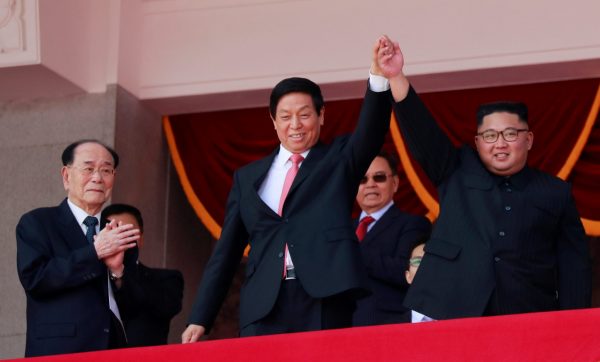After US Secretary of State Mike Pompeo’s fourth visit to Pyongyang on 7 October 2018, he travelled to regional capitals to debrief top officials on the state of affairs between the United States and North Korea. But unlike Pompeo’s meetings in Seoul and Tokyo, Beijing had other items on the agenda. Chinese Foreign Minister Wang Yi admonished the United States, not only for ‘escalating trade frictions’ but also for its recent actions regarding Taiwan and US President Donald Trump’s accusations of Chinese election meddling.
The United States needs China, a permanent member of the United Nations (UN) Security Council, for multilateral sanctions against Pyongyang. The ‘maximum pressure’ campaign of 2017 was more effective than past sanction regimes because of China’s and Russia’s participation.
But united international pressure on North Korea is now fracturing back into its former divisions. Top officials from China, Russia and North Korea held their own meeting in October 2018 and collectively called for a reduction of economic sanctions as a reward for North Korea’s halt in nuclear and missile testing.
Chinese cross-border commerce with North Korea, which Beijing largely cut-off in the second half of 2017, has also picked up again since the US–North Korea summit in June 2018. According to multiple reports, these revived cross-border flows include tourism and trade in commodities such as coal.
It may be easy to claim — as President Trump has — that China is motivated to undermine US sanction efforts as a counterpunch in the US–China trade war. But this stance overlooks the strategic value of China maintaining productive relations with its Korean War ally.
China’s priority in the region is stability, which it has partly maintained over the years by shielding North Korea from the effects of harsh UN sanctions. But relations between Pyongyang and Beijing hit unprecedented lows after North Korean leader Kim Jong-un and Chinese President Xi Jinping rose to power in 2011 and 2012 respectively. The lack of communication between Kim and Xi, combined with the potential instability of North Korea’s nuclear program, were more relevant factors in China’s decision to finally participate in punitive measures against North Korea in 2017 than the acclaimed friendship between Xi and Trump. Even then, the strongest sanction resolutions were only implemented after Russia and China negotiated to remove a provision for a full oil embargo, fearing it might lead to regime collapse.
The relationship between Beijing and Pyongyang is now changing. Since the diplomatic thaw of 2018, Kim and Xi have met three times. Diplomacy with North Korea is also exposing rifts in the US–South Korea alliance. What these developments suggest is that a resolution between China and the United States (such as the unlikely scenario of their trade war being resolved at the G20 meeting in November 2018) will not suddenly make China feel inclined to cooperate with the United States on North Korea. The region’s geopolitical dynamics have markedly shifted from where they were in the first half of 2018.
Not only are China and North Korea frequently engaging in government and military talks, lower-level exchanges are also taking place. A delegation consisting of China’s men’s and women’s national basketball teams visited Pyongyang in early October 2018. China seems to have appropriated North Korean basketball diplomacy, once the providence of the United States’ Dennis Rodman.
The notion that the United States is pursuing a comprehensive strategy of ‘keeping China down’ (daya Zhongguo) is gaining traction in Beijing — evidenced by a September 2018 opinion piece in the Party mouthpiece People’s Daily that was signed by Zhongsheng, the pen name that the paper uses for authoritative statements. China still maintains a stance of denuclearisation on the Korean Peninsula. But under conditions of rapprochement with Pyongyang and a more confrontational relationship with the United States, China has gained leverage over North Korea with little incentive to cooperate with Washington.
In the meantime, Kim can sit back and watch the United States and China compete for his favour as they jockey for regional influence. So far, the winner of the US–China dispute is North Korea.
Nate Kerkhoff is a master’s candidate in the Yonsei University Graduate School of International Studies. He is also a Young Scholar at the Pacific Forum.
Joel Petersson Ivre is a master’s candidate in the Yonsei University Graduate School of International Studies.

